[Original by Yui SHOJI, 2020 Public Relations Intern (October 21, 2020); Translated by J. Tsuchiya/A. Taguchi]
Hello, I am Shoji, a 2020 Public Relations (PR) Intern. This time, I interviewed Ms. Inami who is in charge of Accounting and Labor Affairs. She has worked in JVC for about 30 years. She talked about some surprising stories from JVC’s history like how there used to be staff members who took their children to the JVC office to work. In addition, her memories of Vietnam still influence her current life. Please stay with us!
30 years ago, why did you start working for JVC?

We laughed a lot during the interview. Ms. Inami (upper left), Shoji (upper right), and Kanaoka (bottom).
I suppose JVC and I were linked by fate. A friend of my boyfriend (now my husband) happened to sit next to a JVC staff for the Ethiopia project while in an airplane. Since my boyfriend was interested in international cooperation, this friend introduced JVC to him. The following week after his friend gave him an introduction, my boyfriend took me to JVC’s office. There were many volunteers around my age and the atmosphere was just like having group activities in the university.
How was JVC at that time?
I found JVC very innovative. Many people in my generation used to think that it was natural to stop working if you get married. Amid such a general atmosphere, however, not only single women but also mothers worked actively for JVC at that time. Currently, working mothers can enjoy a relatively more equal treatment between men and women and support systems such as day-care centers where they can leave their children while they work. But 30 years ago, women couldn’t. If a woman wanted to continue working, she had to work incredibly hard.
What surprised me most when I visited the JVC office (it was located in Yushima at that time) was that there was a baby bed behind a desk. The size of the office was very small, about less than half of its current size. I was amazed to see everyone at JVC working, nurturing, and babysitting at the same time because both the accounting assistant and public relations staff had newborn babies. Nowadays, you may watch TV programs featuring companies that accommodate day-care rooms to let mothers take their children with them. But JVC has been like that since those days. It may be because JVC did not have a developed payroll system yet at that time. Another reason may be that JVC was originally established in Thailand where people believe that everybody helps raise others’ children. I was impressed by the fact that the JVC office had that kind of environment.
Please let us know why you started to work as a Vietnam Officer after you entered JVC as a volunteer for the Ethiopian Team.
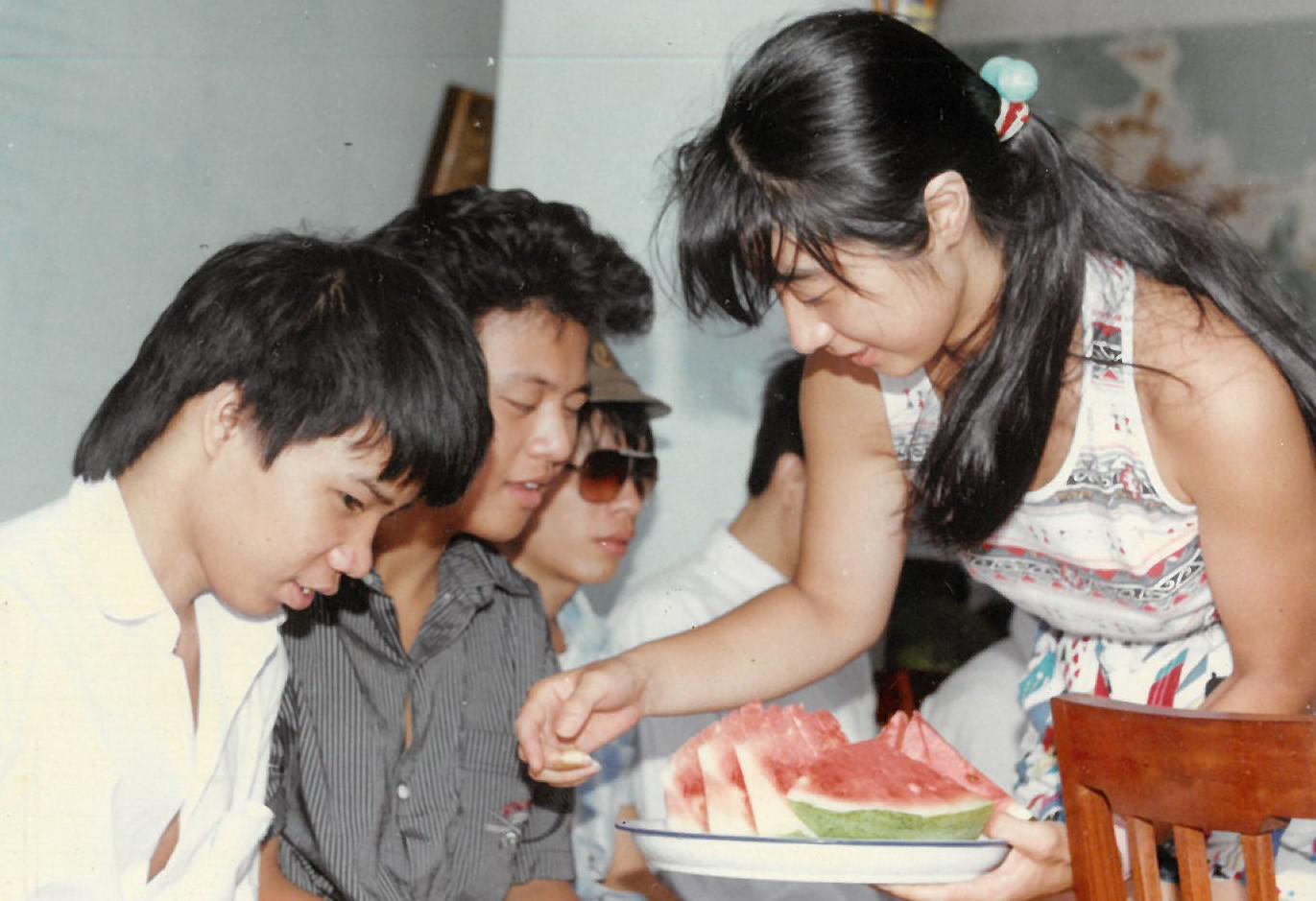
Ms. Inami was distributing watermelon to the students in a Braille class under the umbrella of Hai Phong City Association for the Blind. At that time, JVC supported mainly vocational training schools for repatriated refugees, but it also provided support to schools for hearing impaired children and blind children.
It just happened. When JVC started its activity in Vietnam, my boyfriend, a very energetic guy, was asked to work there. He started working during the fall of his last year in university. Eventually, I decided to go there as well, and we ended up getting married.
Wow, unbelievable… Sounds like it’s better to get married to go there together rather than having a long-distance relationship, right?
Well, in addition to that, it was very difficult to get a visa to Vietnam at that time. Vietnam did not welcome single men from other countries. We received a positive response, probably because a couple was regarded as safer or reliable. I might not have gone to a conflict region, but I decided to go to Vietnam because we could easily get a job as a family. I was 23 years old. We lived in Hai Phong City, a four to five-hour drive from Hanoi (now it takes only an hour via highway). We were the only Japanese who lived there after three decades.
Do you have any memorable experiences you can share with us when you were in Vietnam?
Yes, there were so many interesting experiences. One of them was that I couldn’t go anywhere without permission. At that time, I was sometimes followed by the security police. There were only a few Japanese in the city, so we were easily noticed. We have a skeletal frame different from the Vietnamese, so we drew the attention of everybody, not only of the police. I was sometimes talked about behind my back just because I was wearing a long skirt. Thanks to this experience, I don’t feel inconvenienced even if I can’t go out during the COVID-19 pandemic.
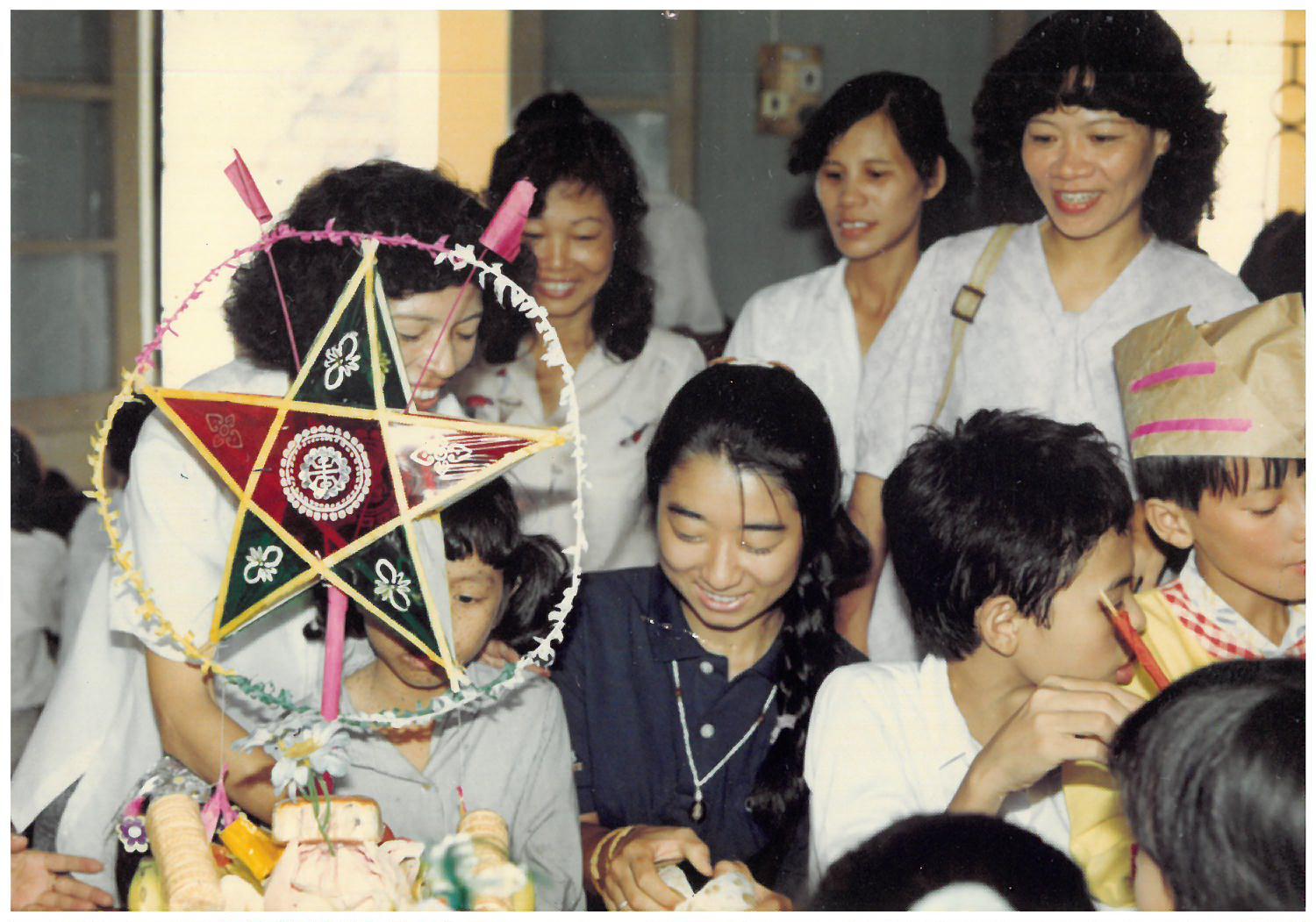
She was invited to a party to appreciate the harvest moon at the School for Hearing Impaired Children in Hai Phong City. Children always looked forward to taking part in it. Behind her are teachers wearing white shirts.
Vietnamese women didn’t wear skirts?
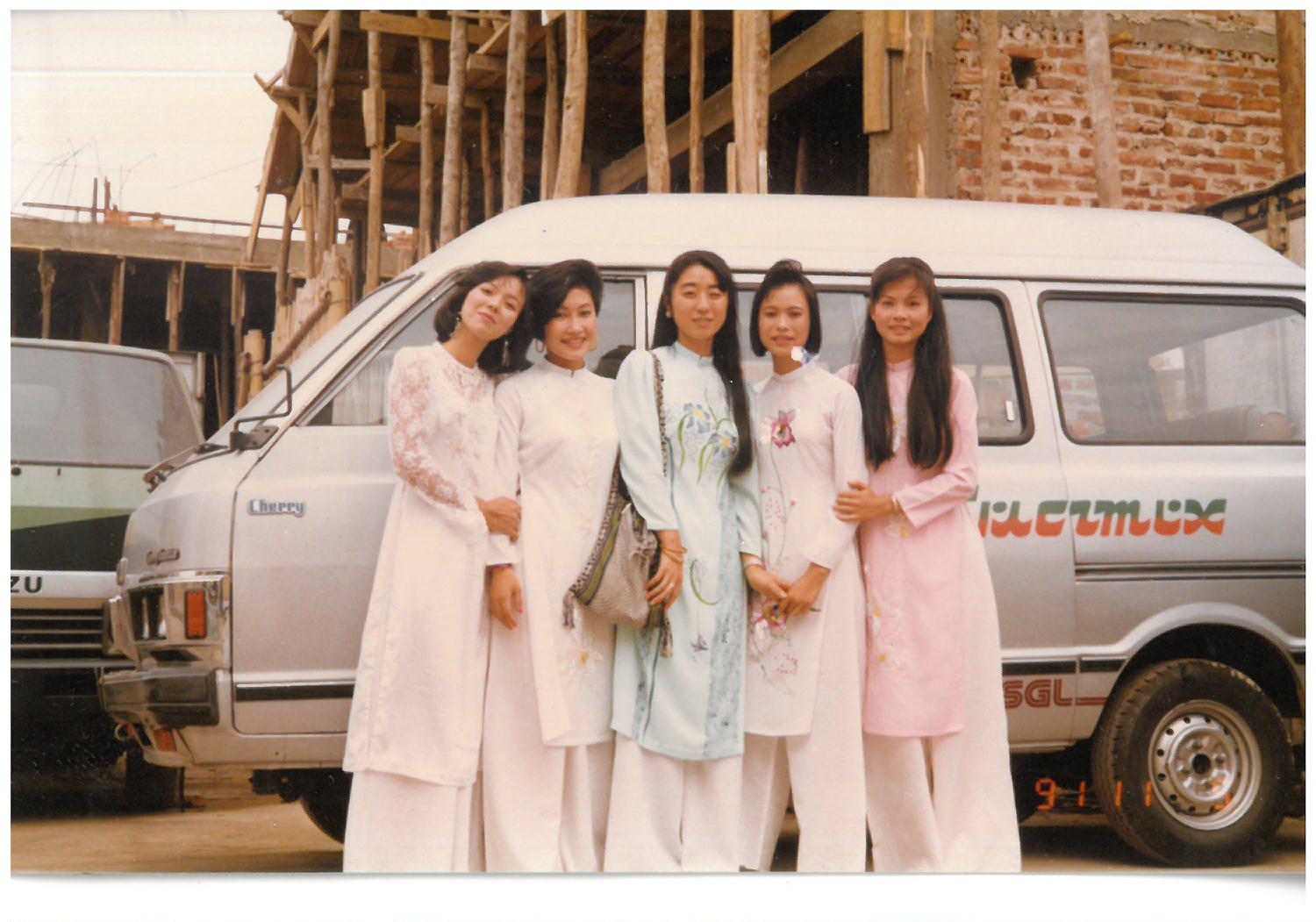
At the opening ceremony of an automotive technical school in Bach Dang that JVC supported. Ms. Inami (center) was with students in a dressmaking class. The school building was still under construction. The girls wore ao dai, a traditional costume of Vietnam.
Women used to wear skirts only at home. They wore pants outside, especially in the northern region. I heard that someone threw a stone at a traveler who wore shorts.
She wasn’t attacked or something like that?
No, Vietnam is the safest country in the world, I think. I recommend you visit there because even though you are robbed of your belongings, never of your life. The present corona pandemic reminds me of my experiences in Vietnam, including those of enduring hot nights without electricity due to outages.
What was that like?
You had no other choice but to bear the heat, fan yourself, or find a cool place. I often couldn’t get the things I needed. I had to live on limited things and endure the restrictions on movement. I think such experiences at the age of 23 trained me and made it easier to live through this pandemic.
Is there any difference in the national character of the Vietnamese and the Japanese?
The Vietnamese are similar to the Japanese. I think that is why there are many Vietnamese studying and working in Japan. I find the Vietnamese ways of working more similar to the Japanese than those of other Asian people. Both use chopsticks and eat rice. In addition, the type of Buddhism prevailing in the two countries is Mahayana, which is different from the Theravada that most Thai people believe. The Vietnamese and Japanese share the same feelings. Heroes turn into gods in Vietnam, so I think they can understand the Japanese idea of having a myriad of gods. One big difference is that they are more outspoken. In Vietnam, things go well if they make sense, so it is sometimes necessary to make things clear without leaving any ambiguity. In a meeting with expatriate wives, I heard that some of them became straightforward after coming to Vietnam.
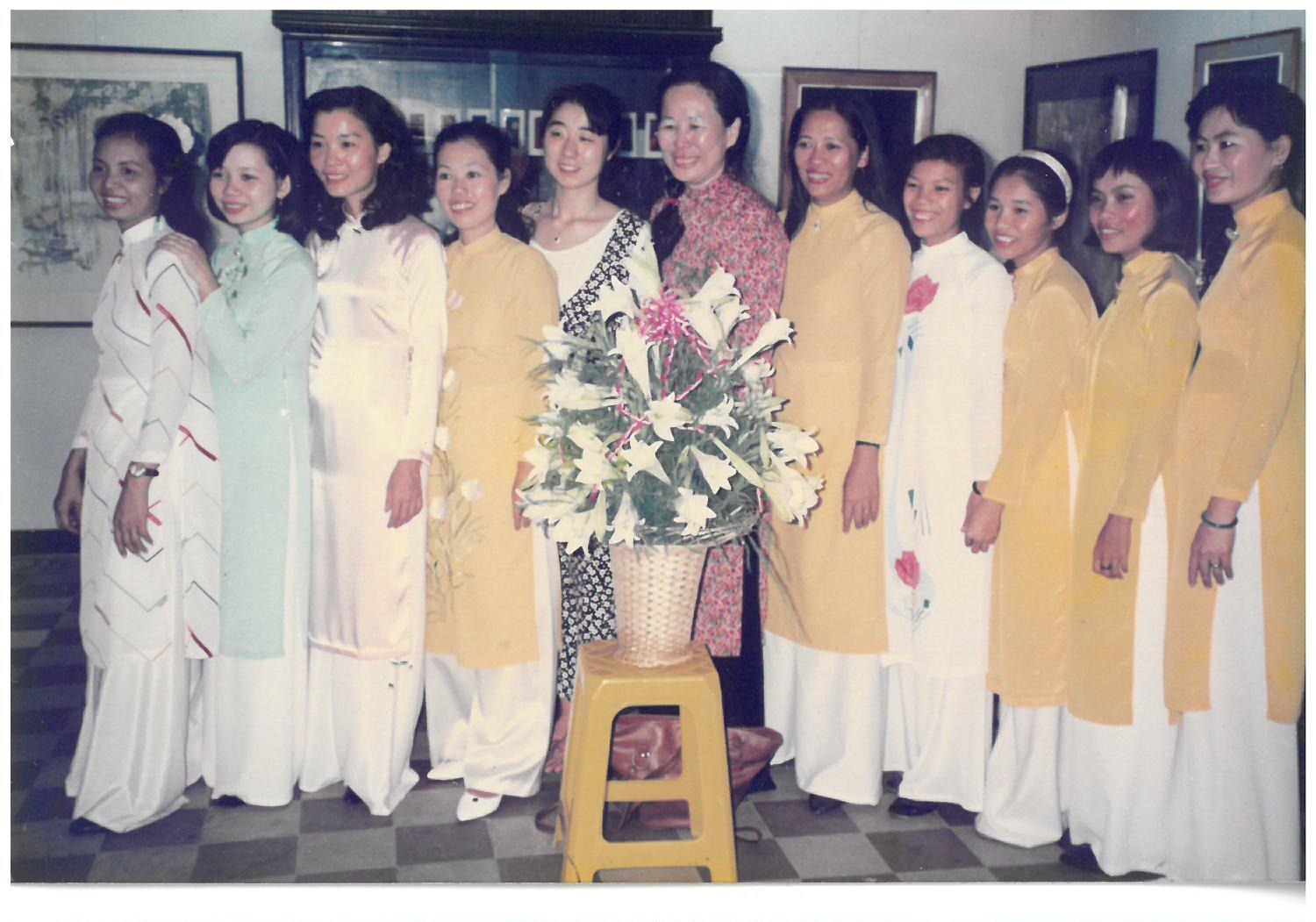
A picture taken with the teachers working in the School for the Ho Chi Minh City Handicapped Children. Ms. Inami happened to visit the school on March 8, International Women’s Day, when they were wearing ao dai.
Going back to the previous question, I started working in Vietnam maybe because I was linked by fate with Vietnam. There is a phrase in Vietnam that means “be linked by fate”: co duyen. And duyen is written as en (縁) in Chinese character, which means “link” or “bond”. You can sometimes understand Vietnamese words more easily by imagining Japanese kanji rather than by translating them into English. It is also the same when the Japanese people learn the Korean language. You can find many words in Vietnamese, Cantonese, Chinese, and Korean that have similar pronunciation in Japanese.
Please tell us about what you think haven’t changed in JVC.
Never-ending meetings (lol), but there are fewer aggressive people now. In those days, meetings were a place for quarrels. I think it is because the members were about ten years younger than the current ones.
I see. Well, long meetings still provide opportunities to reveal your own opinions. I guess that people discuss more calmly nowadays by understanding other opinions rather than engaging in quarrels.
Yes, I agree. Since online meetings such as ZOOM became popular, we have longer discussions compared to 30 years ago when we had to go on-site to meet other staff. In those days, the cost for international phone calls was so expensive that we tried to tell only the main points. Are you familiar with FAX? Because we didn’t have around-the-clock internet connectivity at that time, we had to communicate in a kind of cryptic messages. Currently, you can talk freely with the staff members on-site by ZOOM or Skype, can’t you? When I was on site, I had to determine many things by myself as I had no time to wait for the instructions from Tokyo. Nowadays, you can now easily call the staff in Tokyo from the project site, but I doubt whether it is good or not…
Do you have anything to say about your accounting work?
Money is not everything, but without money, we cannot operate JVC. Without the supporters’ wishes and donation, we cannot conduct activities. Accounting work turns the money into accurate numbers and checks whether it is being used properly.
Finally, what would you like to do in the days ahead?
Tidying up, maybe. That is my hobby. If you keep things in order at the JVC office, I suppose it may help get more funds. I also would like to make my daily life simpler. When I have trouble thinking clearly, I tidy up my room. As I am reluctant to do it all at a time, I make up my mind, for example, to clean just one corner of my room for 15 minutes. I take a step-by-step approach.
After the interview
Ms. Inami often used the phrase “I was linked by fate” during the interview. We can understand how much her life has been linked by fate. I have become interested in the Vietnamese language which has a deep relation with Japanese kanji. She has experienced both the old era where there were no good communication tools and the current one where we can easily communicate online. I have come to think seriously about the current ways of communication and how the world connects.
Well, again, here is a portrait of the guest for the next interview. Ms. Inami says, “She has the image of a heroine in the movie Kiki’s Delivery Service.” Please look forward to the next interview!
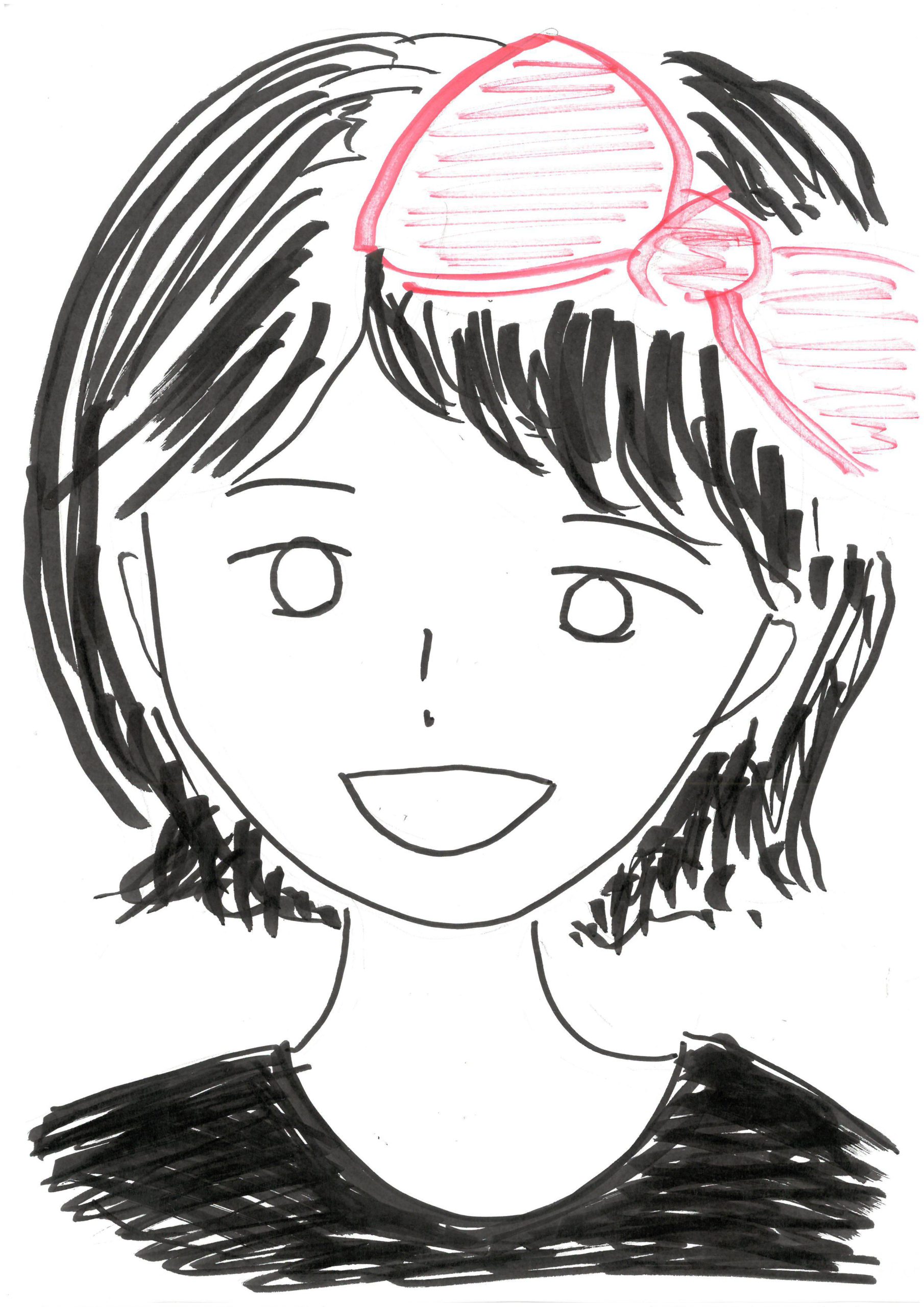
A portrait of the guest for the next interview drawn by Ms. Inami.
